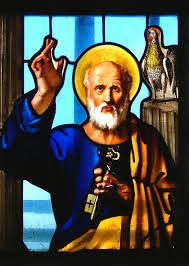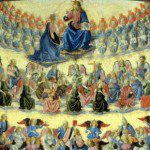 If you could have told Saint Peter that Jesus is God, I think he would have said something like, “you’re nuts”! Just read about Peter in the New Testament (NT) gospels, the early portion of the book of Acts, and the two NT letters attributed to his authorship. If you can read this literature with some objectivity, you may see what I’m saying.
If you could have told Saint Peter that Jesus is God, I think he would have said something like, “you’re nuts”! Just read about Peter in the New Testament (NT) gospels, the early portion of the book of Acts, and the two NT letters attributed to his authorship. If you can read this literature with some objectivity, you may see what I’m saying.
Let’s start with the first place in the NT gospels where Jesus’ identity surfaces among his chosen apostles. It was when Jesus took them to Caesarea Philippi, and asked them, “‘Who do people say that the Son of Man is?’ And they said, ‘Some say John the Baptist, but others say Elijah, and still others Jeremiah or one of the prophets.’ He said to them, ‘But who do you say that I am?'” (Matt. 16.13-15 NRSV and throughout unless noted otherwise). Notice in this Matthean account that Jesus clearly identifies himself as “the Son of Man.”
Then we read next, “Simon Peter answered, ‘You are the Messiah, the Son of the living God'” (Matt. 16.16). Now, all three synoptists (Matthew, Mark, and Luke) record this pericope. If Peter had believed at this point in Jesus’ public ministry–which was perhaps about halfway through that approximately three-year period–that Jesus was God, surely Peter would have thought it important to include this in his confession. Wouldn’t you have done so if you were in Peter’s shoes? I’m pretty sure I would have.
For those who think Peter did say here that Jesus was God, by calling him the Son of God, for those poor folks there is no hope! Just kidding. No, Jesus or Peter identifying Jesus as “the Son (of God)” does not indicate Jesus is God, no matter how much church fathers or church pastors have said so. (See my post, “Is Jesus God Because He Is the Son of God?“) The Old Testament calls angels, men, the king of Israel, and Israel itself “Son/son (of God).” This use of Son/son in the OT can be no different in the NT. It merely means that person or Israel has a special relationship with God. Furthermore, in the NT, Paul calls Christians “sons of God” (Galatians 3.26). The KJV and NRSV have “children” here, which is wrong. The Greek text has huioi, which is rightly translated “sons” in the NASB, NIV, and ESV.
This is such an important point since church fathers established the precept officially at the Nicene Council of 325 that Jesus is “very God of very God.” It’s in their Nicene Creed. The main reason most Christians believe Jesus is God is they were taught he is the Son of God, since if a man has a son, that son becomes a man; thus God’s Son must likewise be God. That, folks, is metaphysical reasoning borrowed from prevalent Greek philosophy in their Hellenistic world. Those church fathers certainly didn’t get that from their Bibles, much less the Jews.
Moreover, this is confirmed in what Matthew writes next: “Then he sternly ordered the disciples not to tell anyone that he was the Messiah” (Matt. 16.20). So, for Matthew to say this, he obviously believed that in Peter’s confession the two titles Messiah and Son of God are interchangeable, thus pretty much meaning the same thing. See also Caiaphas’ question to Jesus at the interrogation of him: “tell us if you are the Messiah, the Son of God” (Matt. 26.63). In fact, most distinguished, NT scholars, even Trinitarians, now say Messiah and Son of God mean the same.
Apparently, soon after Jesus had this conversation with Peter–to which only Matthew adds important detail in Matt. 16.17-19–we read in all three synoptics that Jesus told his disciples expressly for the first time, in no uncertain language, that “he must go to Jerusalem and undergo great suffering at the hands of the elders and chief priests and scribes, and be killed, and on the third day be raised” (v. 21).
Then Matthew adds, “Peter took him [Jesus] aside and began to rebuke him, saying, ‘God forbid it, Lord! This must never happen to you'” (Matt. 16.22). Now, pray tell me, if Peter had believed at that moment that Jesus was God, would Peter have done such a crazy stunt? NO WAY!!! Peter believed like all religious Jews who thought a special Messiah/Christ (=anointed one) would someday come to redeem Israel. Peter believed this Messiah would be a human being and no more, perhaps endowed with special powers from God, but still no more than a human being.
Now, I get criticized by some readers of my book, The Restitution of Jesus Christ (available at kermitzarley.com) wherein I say Jesus was no more than human. Since he exercised supernatural powers, they want to say more about his identity than that. But folks, you cannot support that from the Bible. Moreover, what Peter did here militates against it. Peter thought Jesus was a human being and no more, not man and angel, not man and God, or something in between. No, Peter thought Jesus was a man, and that was it. But Peter and the apostles thought God certainly empowered Jesus in order for him to do all those many miracles. But neither that, nor his Virgin Birth, nor his impending resurrection from the dead indicates that Jesus was God.
Moreover, I think Jesus was more human than we are. Look at the book of Daniel. God likens the kingdoms of men to beasts. Or how about the book of Revelation, in which worshippers of the yet future Antichrist and God call him “the beast.” Mark these words: Jesus was a human being par excellence as God intended humans to be when he first made them. But then came the Fall, and you know the rest. Ever since, God looks at the rest of us humans, besides Jesus, as subpar, “cracked icons” as my friend Professor Scot McKnight writes in his book Embracing Grace. God is in the business of restoring us who believe in him and his Son into fully human people and thus no longer part human and part beast, such as with a “heart of stone” (Eze. 36.26; cf. Jer. 31.33).
But let’s move on through the NT regarding this subject and the Apostle Peter. Another time, Jesus taught metaphorically that he had come down from heaven like the manna that came down from the sky for the starving Israelites in the wilderness (John 6). He also said then, “those who eat my body and drink my blood have eternal life” (v. 54). Some of his listeners objected. Then we read, “Because of this many of his disciples turned back and no longer went about with him. So Jesus asked the twelve, ‘Do you also wish to go away?’ Simon Peter answered him, ‘Lord, to whom can we go? You have the words of eternal. We have come to believe and know that you are the Holy One of God'” (vv. 66-69). Again, Peter was not saying Jesus was God but that he belongs to God.
And look at how Peter concludes the salutation in his first NT letter. He says, “Blessed be the God and Father of our Lord Jesus Christ!” (1 Peter 1.3). Peter does three things here: (1) he distinguishes between God and Jesus as two separate persons, which Peter does often in the NT; (2) he identifies God exclusively as “the Father,” so that Jesus cannot also be God; and (3) he says Jesus has a God, who is the Father. Neither Peter nor any person or writer of the NT says the Father has a God. Rather, Jesus has a God, who is the Father, and his God-Father is Almighty God, thus more mighty than Jesus.
Now, for those who think Jesus’ resurrection from the dead proved that he is God, let’s see what Peter had to say about that matter. When Peter saw, talked to, and perhaps touched the risen Jesus, if he had then believed that Jesus was God, surely Peter would have afterwards declared this about Jesus more than anything else. Well, Peter was the spokesperson for the apostles on the Day of Pentecost, only ten days after the risen Jesus ascended to heaven. The Holy Spirit came upon the disciples and they spoke with tongues, that is, in languages they did not know (Acts 2.1-13). Peter then delivered his first sermon. It was to thousands of Jews attending the feast. He proclaimed, “You that are Israelites, listen to what I have to say: Jesus of Nazareth, a man attested to you by God with deeds of power, wonders, and signs that God did through him among you, as you yourselves know” etc. (v. 22). So, Peter said Jesus was “a man attested … by God” with deeds “God did through him.”
Likewise, some time later, Peter preached the gospel to the Roman Cornelius and his household, saying, “God anointed Jesus of Nazareth with the Holy Spirit and with power; how he went about doing good and healing all who were oppressed by the devil, for God was with him” (Acts 10.38).
So, Jesus did not do those supernatural acts by some innate power that was part of his own nature, and certainly not because he was God, thus with a divine nature. Proof of this is that the Johannine Jesus earlier was accused of “making himself equal with God” (John 5.18). He denied it by saying, “Very truly I tell you, the Son can do nothing on his own, but only what he sees the Father doing” (v. 19, cf. v. 30). So, Jesus is here saying that he does not do miracles by some divine nature that is part of his being. In a lengthy rebuttal (vv. 19-46), he called the Father “the one who alone is God” (v. 44). Later, the Johannine Jesus explained, “The Father is greater than I” (14.28).
There is no getting around this, friends; Jesus is inferior to God the Father, who alone is Almighty God, because Jesus is no more than a man. Granted, Jesus was conceived supernaturally, thus there was the Virgin Birth. But that does not make him more than a man. Adam, the first man, did not have a natural birth either, being created from the dust of the ground; but that did not make him God or a god.
Some may say, what difference does all this make? It makes a whole lot of difference to people like me. I was a Christian for five years before I was taught the church doctrine of the Trinity and therefore that Jesus is God. I believed it for the next 22 years. I was a devout Evangelical Christian conducting Christian ministry as a full-time professional golfer on the regular PGA Tour. Then in my last full-time year on the regular Tour, 1982, I read myself out of Trinitarianism in the Bible.
I knew what I was getting into because I knew something about the church history on this matter. The post-apostolic Catholic Church–at Nicea in 325 from which came the Nicene Creed–said you must believe Jesus is God to be a Christian. In giving up the so-called “deity of Christ,” my church and many of my Christian friends, including those with whom I was involved in ministry, would reject me as a true Christian or at the very least brand me as some kind of heretic.
But I made the decision to go with God because I believed he is the One who revealed this to me. It has not been easy. Jesus didn’t say it would be. Instead, he said, “follow me,” and he went to cross. I have suffered rejection from many people who I believe to be my brethren in God and Christ. They simply have not seen the light yet on this subject. Most probably they never will until they get to glory. My job is to love them, but still hold fast to God and Christ as I understand them.
One more thing about what difference does all this make. I believe post-apostolic church fathers somewhat changed the gospel. I still think, and always will, that you can be a Trinitarian and still be a born-again Christian. (See my post, “Can Genuine Christians Be Trinitarian or Non-Trinitarian?“) Yet I believe Trinitarianism looks like the worship of three Gods/gods, just as Jews and Muslims allege, even though Trinitarians vehemently deny this and claim to worship one God. It’s just that Trinitarians do not see God and Jesus as fully as the Bible presents them. Making God out to be a trinity of persons, so that Jesus is God/deity/divine, somewhat ruins the gospel. How so?
Jesus was “a man attested … by God” as Peter preached. Our loving God sent Jesus to be our Savior, to save us from the condemnation of our sins, which results in eternal separation from God. Jesus bridged the gulf between us sinners and God. He provided “the way” for our salvation (John 14.6). He triumphed in this so difficult task that God gave him to do. And because of Jesus’ victory, God makes him the head of the human race. He is the Lamb of God who overcame the world as the book of Revelation declares repeatedly. He will be the king of king and lord of lords forevermore.
Jesus was no more than a man, thus not a preexistent person. Rather, “he had to become like his brothers and sisters in every respect” (Hebrews 2.17). He couldn’t do that if he was an actual person who preexisted as the Son-Logos as Nicene and Post-Nicene church fathers taught.
Therefore, God will greatly bless the overcoming Jesus, that “man” who was tempted in all things as we are, yet without sin (Hebrews 2.18). As a former Trinitarian, I don’t think Trinitarians, or Binitarians, can truly appreciate how Jesus overcame, how he gained the victory, because they believe Jesus was more than a man. As a Trinitarian, I didn’t. That’s what I think to some degree ruins the gospel of our Lord Jesus Christ and thereby imperils, just a little, the strength of our Christian faith. And I think one who overcame his impetuousness in following this man Jesus, Saint Peter, would say a hearty AMEN to this.
…………….
To see a list of titles of 130+ posts (2-3 pages) that are about Jesus not being God in the Bible, with a few about God not being a Trinity, at Kermit Zarley Blog click “Chistology” in the header bar. Most are condensations of my book, The Restitution of Jesus Christ. See my website servetustheevangelical.com, which is all about this book, with reviews, etc. Learn about my books and purchase them at kermitzarley.com. I was a Trinitarian for 22 years before reading myself out of it in the Bible.













